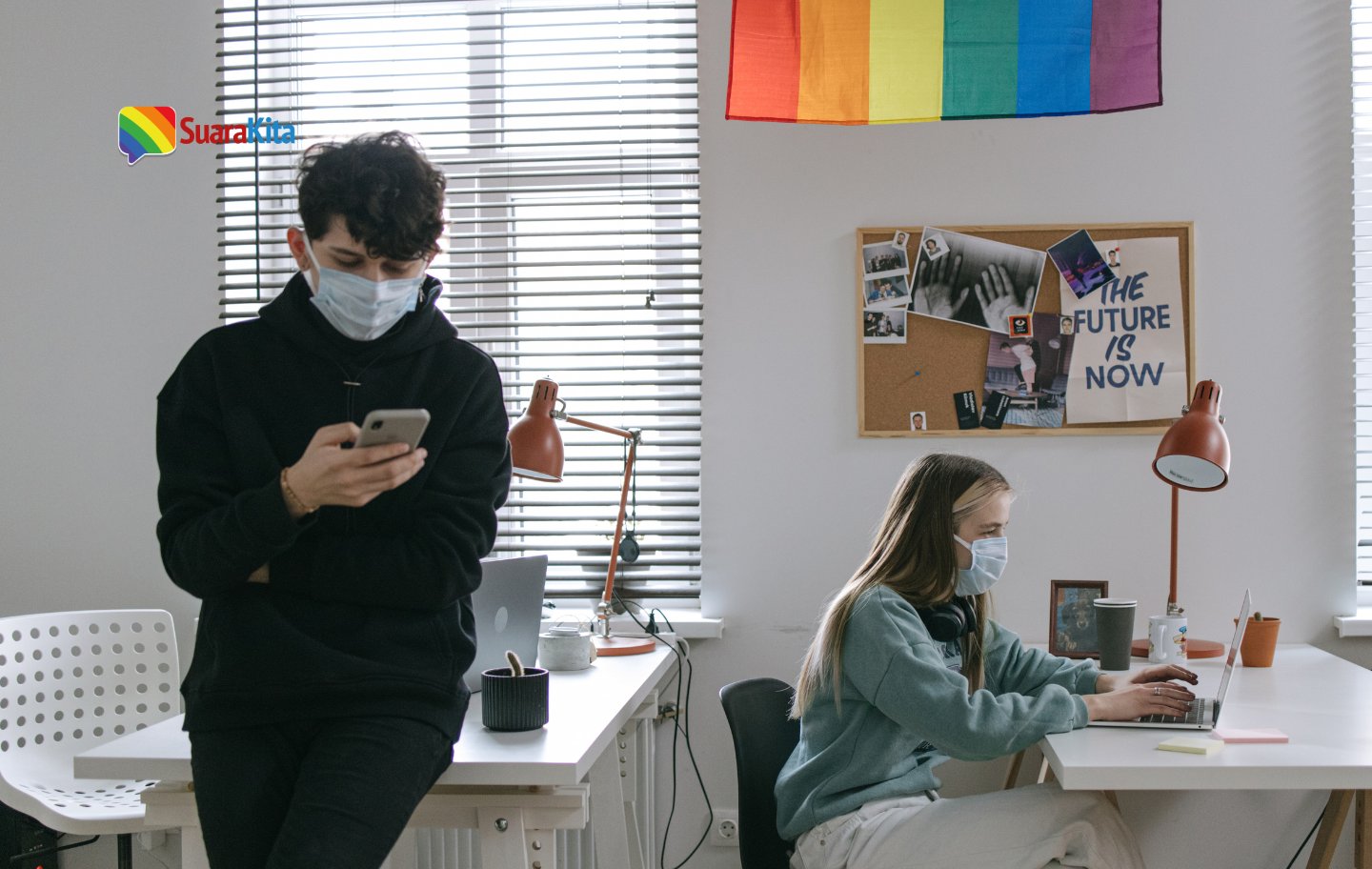BAYANGKAN apabila anda harus melarikan diri dari negara sendiri, karena orientasi seksual anda bisa mengancam nyawa sendiri. Inilah yang dihadapi John dan David. Pasangan sesama jenis atau gay dari sebuah negara tetangga Kenya yang mencari perlindungan di Kakuma, sebuah kota di Kenya Barat Laut. Di sana terdapat 96 ribu pengungsi yang baru-baru ini dikunjungi Menteri Imigrasi Belanda Gerd Leers.
Penempatan kembali. Itulah kata-kata kramat bagi kebanyakan pengungsi. Setiap tahun, Organisasi Pengungsi Dunia UNHCR menyeleksi beberapa ribu pengungsi untuk bisa memulai hidup baru di negara lain. Amerika adalah negara pendukung utama dalam proyek ini, dengan menerima 50 ribu pengungsi dari seluruh dunia setiap tahunnya. Belanda memiliki program serupa dengan jumlah lebih kecil yaitu 500 orang setiap tahunnya. Pekan ini Menteri Imigrasi Belanda Gerd Leers yang berkunjung di Kenya, menyampaikan kejutan bagi penduduk Kakuma.
“Mulai saat kami datang di sini, kami berharap untuk bisa keluar secepatnya,” kata John sambil menggenggam tangan pasanganya David. “Kami harus tidur di tanah, orang bersikap tidak bersahabat terhadap kami.”
Kedua pria ini termasuk orang-orang yang beruntung diseleksi untuk wawancara dalam program penempatan kembali. Sebuah proses panjang, dan mereka tidak tahu negara mana yang akan menerima mereka. “Kami dengar mungkin kami bisa pergi ke Belanda,” kata John. “Insyaallah!”
Menurut Kepala UNHCR di kamp tersebut, Guy Avognon, program mereka ini memberi harapan di tengah-tengah situasi yang kelam.
“Sejumlah pengungsi sudah tinggal di sini lebih dari 20 tahun, bahkan sebagian dilahirkan di sini,” jelasnya. “Tidak banyak pekerjaan di kamp dan mereka dilarang keluar kamp. Mereka tidak bisa kembali ke negaranya; satu-satunya harapan mereka adalah penempatan kembali di negara lain.”
Namun hanya 1 persen saja dari kelompok besar ini yang akan benar-benar mendapat peluang untuk naik pesawat menuju ke negara baru. Tidak ada cukup tempat bagi mereka semua.
Doa
Beberapa meter dari pasangan tersebut, seorang pengungsi dari Somalia melintas. Jojo hanya memiliki satu tangan. Al-Shabaab memotong tangannya di muka umum di kotanya Kismayo. Sempalan Al-Quaeda itu menuduhnya mencuri baju, dan ini dibantahnya. Ia meninggalkan negaranya sesudah insiden tersebut.
“Saya tidak akan pernah bisa pulang lagi, saya tidak punya siapa-siapa lagi. Sudah tiga tahun sekarang. Saya berdoa setiap hari agar keadaan ini berubah,” kata Jojo sambil menunjukkan foto tangannya yang dipotong. Ia diwawancara untuk penempatan kembali tapi ditolak.
Undangan yang ditawarkan sebuah negara dibatasi oleh persyaratan tertentu. Menteri Leers menjelaskan persyaratan Belanda. “Kami mengingkan orang-orang yang bersikap terbuka terhadap budaya kami, yang bersedia belajar bahasa kami,” kata Menteri Leers. “Kami memiliki masalah di masa lalu dengan orang-orang yang tidak bisa berintegrasi.”
Ia memberi ilustrasi dengan anekdot. “Ada seorang perempuan dari Pakistan, yang punya banyak anak, misalnya. Ibu ini tidak bisa merawat semua anaknya degan baik, dan pada akhirnya anak-anak itu tercerai berai dari si ibu. Kami tidak menghendaki hal seperti ini, jadi kami akan lebih fokus pada integrasi pengungsi.”
Pembatasan khusus ini mempersulit UNHCR untuk menangani kasus yang paling mendesak. Tidak setiap orang mendapat kesempatan untuk penempatan kembali. “Persyaratan seperti ini menjadikannya sangat elitis,” kata Avognon.
“Kami tidak ingin menghakimi pemerintahan dari negara-negara penerima karena walaupun sedikit tempat yang ditawarkan, mereka toh menyediakannya. Ini tentunya sangat dihargai. Tapi terkadang kita menghadapi resiko kehilangan sisi kemanusiaan, hanya dengan fokus pada orang-orang berpendidikan tinggi, yang bisa menguntungkan perekonomian.”
Jojo berkeliling kamp. Apakah akhirnya dia punya kesempatan untuk pergi? “Setiap pagi saya bangun, saya berharap untuk bisa ke Amerika,” katanya. “Itu satu-satunya harapan yang saya miliki.”
Sementara, John dan David menerima kejutan besar. Di hari yang sama, mereka akan diterbangkan ke Nairobi. Menteri Leers telah menunggu mereka secara pribadi untuk mengundang keduanya tinggal di Belanda – ini tentu saja sesudah menerima kepastian bahwa mereka bersedia bekerja keras setibanya di Belandal. “Ini hal terindah bagi kami,” kata John, dengan mata berkaca-kaca.
sumber : http://internasional.kompas.com
sumber gambar : www.rnw.nl
Imagine having to flee from home because your sexual orientation poses a threat to your life. This is reality for John and David. The gay couple from a country close to Kenya sought safety in Kakuma, the town in north-east Kenya where a camp hosts 96,000 refugees and where Dutch Minister of Immigration Gerd Leers recently visited.
By Maike Winters, Kakuma and Nairobi
Resettlement. The magic word for many refugees. Every year, the United Nations High Commission for Refugees (UNHCR) selects a few thousand for the chance to start a new life elsewhere. The US is the project’s strongest supporter, taking in 50,000 refugees from all over the world every year. The Netherlands’ much smaller programme has an annual quota of 500, although this week the Dutch Minister of Immigration, Integration and Asylum Affairs, Gerd Leers, delivered some very big news to two residents of Kakuma.
Hopes
“From the moment we arrived here, we hoped to get out as soon as possible,” says John while clutching his partner David’s hand. “We have to sleep on the ground, people are hostile to us.”
The two men are among the lucky few selected for a resettlement programme interview. It’s a long process, and they don’t know yet if a country will accept them. “We heard we could maybe go to the Netherlands,” says John. “Let’s hope so!”
According to the UNHCR head at the camp, Guy Avognon, their programme offers hope in otherwise hopeless circumstances.
“Some people have lived here for 20 years, some were born here,” he explains. “There are very few jobs in the camp and they are not allowed outside the camp. They can’t go back to their home countries; resettlement to another country is what they live for.”
Yet only 1 percent of the enormous group of refugees actually gets the chance to board the plane bound for a new world. There are simply not enough places.
Prayers
A few metres from the couple, a refugee from Somalia walks by. Jojo is missing a hand. Al-Shabaab chopped it off at a public trial in his hometown of Kismayo. The al-Quaeda cell accused him of stealing a shirt, which he denies. He fled the country after the incident.
“I can never go back, and I have nobody here. It’s been three years now. I pray to God every day for things to change,” Jojo says, showing a picture of his severed hand. He had an interview for resettlement, but wasn’t accepted.
Conditions
The invitations a country offers are restricted by certain conditions. Minister Leers explains those of the Netherlands. “We want people who are open to our culture, who are willing to learn our language,” says Minister Leers. “We had problems in the past with people who couldn’t integrate.”
He illustrates with an anecdote. “There was a woman from Pakistan, for example, with many children. She couldn’t take care of them and, in the end, all her children were separated from her in the Netherlands. We don’t want this, so we will focus more on integration chances of refugees.”
Specific constraints make it hard for UNHCR to attend to the most urgent cases. Hardly everyone gets an opportunity for resettlement. “All these conditions make it quite elitist,” says Avognon.
“We don’t want to put any judgment on what governments are doing, because no matter how many places they give, they give them. And that is very much appreciated. But sometimes the risk is that we lose the humanitarian side of it, by just focusing on highly qualified people, people who can benefit the economy.”
Some win, many wait
Jojo wanders around the camp. Will he ever get the chance to leave? “Every morning I wake up, hoping I will go to America,” he says. “It’s the only hope I have.”
Meanwhile, John and David have gotten the surprise of their lives. On the very same day we talk, they will be flown to Nairobi. Minister Leers is waiting there to personally invite them to live in the Netherlands – that is, after ensuring they are willing to work hard on arrival. “It’s the best thing that has happened to us,” says John, his eyes gleaming.
source : http://www.rnw.nl



